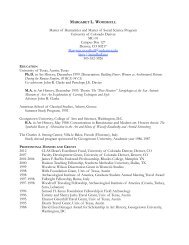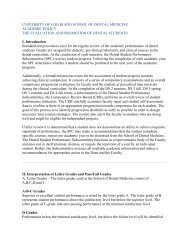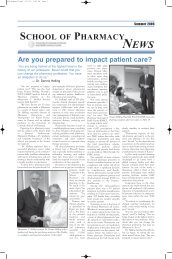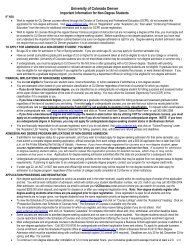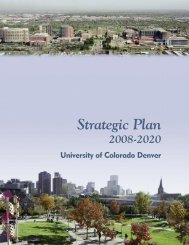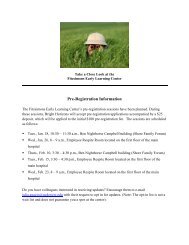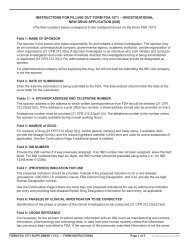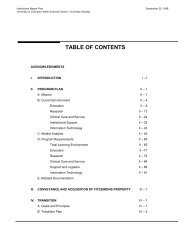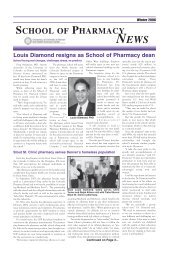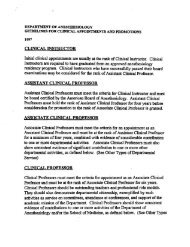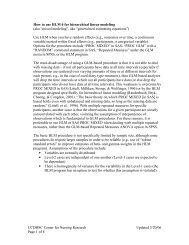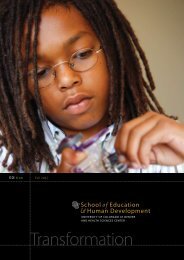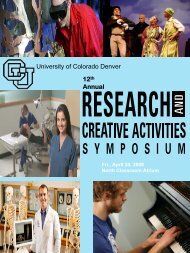teaching assistants in the college, a draft policy.doc - University of ...
teaching assistants in the college, a draft policy.doc - University of ...
teaching assistants in the college, a draft policy.doc - University of ...
Create successful ePaper yourself
Turn your PDF publications into a flip-book with our unique Google optimized e-Paper software.
Teach<strong>in</strong>g by Graduate Students <strong>in</strong> <strong>the</strong> College <strong>of</strong> Architecture and Plann<strong>in</strong>g<br />
Def<strong>in</strong>itions:<br />
GA- Graduate Assistant, PS job code number 1502. Full time, regularly enrolled, degree seek<strong>in</strong>g<br />
graduate students <strong>in</strong> good stand<strong>in</strong>g who have assignments with<strong>in</strong> <strong>the</strong> department, but are not<br />
directly <strong>in</strong>volved <strong>in</strong> <strong>in</strong>struction.<br />
GPTI- Graduate Part-Time Instructor, PS job code number 1503. Graduate student <strong>in</strong> good stand<strong>in</strong>g<br />
who must have master's degree or equivalent, and who have demonstrated competence <strong>in</strong><br />
classroom <strong>teach<strong>in</strong>g</strong>. GPTIs generally are given full responsibility for an undergraduate class. The<br />
activities may <strong>in</strong>clude prepar<strong>in</strong>g <strong>the</strong> course syllabus, <strong>in</strong>struct<strong>in</strong>g <strong>the</strong>ir class, hold<strong>in</strong>g <strong>of</strong>fice hours,<br />
determ<strong>in</strong><strong>in</strong>g <strong>of</strong> grades, etc. GPTIs must be enrolled as a full-time, regularly enrolled, degree-seek<strong>in</strong>g<br />
graduate student.<br />
GRA or RA - Graduate Research Assistant, PS job code number 1505. RA’s must be enrolled<br />
as a full-time, regularly enrolled, degree-seek<strong>in</strong>g graduate students <strong>in</strong> good stand<strong>in</strong>g. The activities<br />
may <strong>in</strong>clude assist<strong>in</strong>g with and perform<strong>in</strong>g research, writ<strong>in</strong>g up results <strong>of</strong> experiments, and<br />
present<strong>in</strong>g f<strong>in</strong>d<strong>in</strong>gs at conferences, which potentially may <strong>in</strong>volve travel.<br />
TA- Teach<strong>in</strong>g Assistant, PS job code 1506. Graduate students <strong>in</strong> good stand<strong>in</strong>g who supervise and<br />
lead quiz sections, discussion sections, recitations or laboratory sections, serve as class <strong>assistants</strong>, or<br />
perform comparable activities. Must be enrolled full-time, as a regular degree-seek<strong>in</strong>g graduate<br />
student. Each TA must be under <strong>the</strong> guidance <strong>of</strong> a particular pr<strong>of</strong>essor(s) designated by <strong>the</strong><br />
department chair or his/her delegate. TAs are not placed <strong>in</strong> overall charge <strong>of</strong> courses.<br />
Grader- Teach<strong>in</strong>g Assistant, PS job code 1506. Graduate students <strong>in</strong> good stand<strong>in</strong>g who serve as<br />
class <strong>assistants</strong> and grade tests, quizzes and/or papers and lead review/discussion sessions. Must be<br />
enrolled full-time, as a regular degree-seek<strong>in</strong>g graduate student. Each TA must be under <strong>the</strong><br />
guidance <strong>of</strong> a particular pr<strong>of</strong>essor(s) designated by <strong>the</strong> department chair or his/her delegate. TA<br />
Graders are not placed <strong>in</strong> overall charge <strong>of</strong> courses.<br />
Terms and Conditions <strong>of</strong> Appo<strong>in</strong>tments:<br />
1. With<strong>in</strong> a department, and as far as possible throughout <strong>the</strong> <strong>University</strong>, graduate appo<strong>in</strong>tees<br />
hold<strong>in</strong>g <strong>the</strong> same type and level <strong>of</strong> service appo<strong>in</strong>tment should have equal workloads. In<br />
mak<strong>in</strong>g <strong>teach<strong>in</strong>g</strong> assignments, factors such as course difficulty, necessary class preparation<br />
time, as well as number <strong>of</strong> <strong>in</strong>-course hours, should be considered. The percentage <strong>of</strong><br />
appo<strong>in</strong>tment is meant to represent <strong>the</strong> total time spent <strong>in</strong> class, supervision <strong>of</strong> TAs, if applicable,<br />
preparation for class, grad<strong>in</strong>g, and <strong>of</strong>fice hours. The <strong>University</strong> endeavors to provide <strong>teach<strong>in</strong>g</strong><br />
appo<strong>in</strong>tees with facilities needed for satisfactory conduct <strong>of</strong> <strong>the</strong>ir duties, e.g., <strong>of</strong>fice space and<br />
access to telephones.<br />
2. The percentage <strong>of</strong> appo<strong>in</strong>tment must be equated to <strong>the</strong> number <strong>of</strong> hours <strong>the</strong> graduate student<br />
is expected to work. For example, a student who is appo<strong>in</strong>ted for 50% can be expected to work<br />
no more than 20 hours per week. These 20 hours must <strong>in</strong>clude all duties necessary for <strong>the</strong><br />
completion <strong>of</strong> <strong>the</strong> student's <strong>teach<strong>in</strong>g</strong> assignment, i.e., <strong>of</strong>fice hours, <strong>in</strong>-class time, grad<strong>in</strong>g, and<br />
preparation time. Any appo<strong>in</strong>tments that exceed 50% dur<strong>in</strong>g <strong>the</strong> academic year must be<br />
approved, <strong>in</strong> advance <strong>of</strong> <strong>the</strong> beg<strong>in</strong>n<strong>in</strong>g date <strong>of</strong> <strong>the</strong> appo<strong>in</strong>tment, by <strong>the</strong> Dean <strong>of</strong> <strong>the</strong><br />
Graduate School.<br />
4. Appo<strong>in</strong>tment periods: Appo<strong>in</strong>tments can be made on ei<strong>the</strong>r an academic year or semester<br />
basis. Normally, academic year appo<strong>in</strong>tments run from August to May. Appo<strong>in</strong>tments for <strong>the</strong><br />
academic year, however, must conta<strong>in</strong> a clause that <strong>the</strong> second semester appo<strong>in</strong>tment is
ased on <strong>the</strong> student's adequate academic progress and adequate performance <strong>in</strong> <strong>the</strong>ir<br />
appo<strong>in</strong>tment as a TA or GPTI (see "General Qualifications for Appo<strong>in</strong>tments" and "Term<strong>in</strong>ation <strong>of</strong><br />
Appo<strong>in</strong>tments" sections). Semester appo<strong>in</strong>tments run from ei<strong>the</strong>r August to December for fall or<br />
from January to May for spr<strong>in</strong>g appo<strong>in</strong>tments. A department may require a student to work<br />
dur<strong>in</strong>g semester breaks. However, <strong>the</strong> department should notify <strong>the</strong> student as part <strong>of</strong> <strong>the</strong> terms<br />
<strong>of</strong> appo<strong>in</strong>tment if it <strong>in</strong>tends to do so. Graduate student appo<strong>in</strong>tees are <strong>in</strong>eligible for paid<br />
vacation or sick leave. A student may make personal arrangements with <strong>the</strong> department for<br />
such leave without pay if needed. Appo<strong>in</strong>tees receive all legal <strong>University</strong> holidays as paid<br />
leave.<br />
5. Graduate student appo<strong>in</strong>tees receive a salary based on <strong>the</strong> percentage and type <strong>of</strong> <strong>the</strong>ir<br />
appo<strong>in</strong>tment. Please check <strong>the</strong> most current Graduate Assistant Appo<strong>in</strong>tment Manual for <strong>the</strong><br />
current salary schedules. Graduate student appo<strong>in</strong>tees are paid on a monthly basis, on <strong>the</strong> last<br />
work<strong>in</strong>g day <strong>of</strong> each month. The student who is on an academic year appo<strong>in</strong>tment receives<br />
<strong>the</strong> first paycheck on <strong>the</strong> last work<strong>in</strong>g day <strong>in</strong> September and <strong>the</strong> last paycheck on <strong>the</strong> last<br />
work<strong>in</strong>g day <strong>of</strong> May. Students employed for fall semester receive <strong>the</strong> first paycheck on <strong>the</strong> last<br />
work<strong>in</strong>g day <strong>of</strong> September and <strong>the</strong> last paycheck on <strong>the</strong> last work<strong>in</strong>g day <strong>of</strong> December.<br />
Students employed for <strong>the</strong> spr<strong>in</strong>g semester receive <strong>the</strong> first pay check on <strong>the</strong> last work<strong>in</strong>g day <strong>of</strong><br />
January and <strong>the</strong> last paycheck on <strong>the</strong> last work<strong>in</strong>g day <strong>of</strong> May.<br />
6. A graduate student is eligible to receive tuition remission based on <strong>the</strong> percentage <strong>of</strong><br />
appo<strong>in</strong>tment, regardless <strong>of</strong> residency status. A department is required to pay for <strong>the</strong> eligible<br />
tuition remission amount, regardless <strong>of</strong> whe<strong>the</strong>r <strong>the</strong> student is a resident or non-resident. A<br />
department cannot pay for only <strong>the</strong> resident portion <strong>of</strong> tuition if <strong>the</strong> student is a non-resident.<br />
7. None <strong>of</strong> <strong>the</strong>se Terms and Conditions <strong>of</strong> Employment may be waived except <strong>in</strong> writ<strong>in</strong>g by <strong>the</strong><br />
Dean or <strong>the</strong> Dean’s delegate.<br />
8. All students appo<strong>in</strong>ted as GPTI’s, TA’s and Graders must have an undergraduate degree that<br />
qualifies <strong>the</strong>m to teach or assist with <strong>teach<strong>in</strong>g</strong> <strong>in</strong> <strong>the</strong> field/subject <strong>of</strong> <strong>the</strong>ir appo<strong>in</strong>tment.<br />
9. All students be<strong>in</strong>g considered for appo<strong>in</strong>tment as GTPI’s, GA’s, TA’s, RA’s or Graders or as firstpr<strong>of</strong>essional<br />
and undergraduate <strong>teach<strong>in</strong>g</strong> aides must be <strong>in</strong> good academic stand<strong>in</strong>g at <strong>the</strong><br />
time <strong>of</strong> <strong>the</strong>ir appo<strong>in</strong>tment.<br />
10. The number <strong>of</strong> student <strong>assistants</strong> that may be used to assist <strong>in</strong> <strong>the</strong> <strong>teach<strong>in</strong>g</strong>/adm<strong>in</strong>istration <strong>of</strong><br />
classes will be consistent with <strong>college</strong> <strong>policy</strong>, which currently allows one appo<strong>in</strong>tment for every<br />
50 students enrolled <strong>in</strong> an undergraduate class, for 40 students <strong>in</strong> a required graduate lecture<br />
class, and for 30 students <strong>in</strong> a required graduate class with complex technical content.<br />
Exceptions to <strong>the</strong>se m<strong>in</strong>imums may be made by <strong>the</strong> Department Chair with <strong>the</strong> consent <strong>of</strong> <strong>the</strong><br />
Dean. Teach<strong>in</strong>g <strong>assistants</strong> may be assigned to required design studios on <strong>the</strong> basis <strong>of</strong> one<br />
appo<strong>in</strong>tment for every 50 students enrolled <strong>in</strong> a designated studio sequence.<br />
11. The first <strong>teach<strong>in</strong>g</strong> assistant appo<strong>in</strong>ted to assist with <strong>the</strong> activities <strong>of</strong> a lecture class will be<br />
appo<strong>in</strong>ted as a Teach<strong>in</strong>g Assistant. All o<strong>the</strong>r <strong>assistants</strong> assigned to help with <strong>the</strong> same class will<br />
be appo<strong>in</strong>ted as graders.<br />
12. Beg<strong>in</strong>n<strong>in</strong>g as soon as practical but not later than <strong>the</strong> beg<strong>in</strong>n<strong>in</strong>g <strong>of</strong> Fall Semester 2005, all<br />
students who formally participate <strong>in</strong> or assist with any and all forms <strong>of</strong> course must undergo sexual<br />
harassment tra<strong>in</strong><strong>in</strong>g, <strong>in</strong>clud<strong>in</strong>g attendance at formal workshops to be provided by <strong>the</strong> Office <strong>of</strong><br />
Sexual Harassment. The <strong>in</strong>structor <strong>of</strong> record must assume <strong>the</strong> primary responsibility for assur<strong>in</strong>g<br />
compliance with all campus and university sexual harassment policies and procedures.
College Policy on <strong>the</strong> Use <strong>of</strong> Undergraduates and Graduate First-Pr<strong>of</strong>essional Students as Teach<strong>in</strong>g<br />
Aides<br />
The <strong>in</strong>clusion <strong>of</strong> undergraduates and graduate first-pr<strong>of</strong>essional students <strong>in</strong> <strong>in</strong>structional activities <strong>of</strong><br />
<strong>the</strong> College has significant educational benefits for <strong>the</strong> participat<strong>in</strong>g students. Assist<strong>in</strong>g with<br />
<strong>in</strong>struction has traditionally been an excellent opportunity for students to test <strong>the</strong>ir abilities as<br />
teachers and as future scholars <strong>in</strong> <strong>the</strong>ir chosen discipl<strong>in</strong>e. At <strong>the</strong> same time, however,<br />
undergraduates and first-pr<strong>of</strong>essional students attend<strong>in</strong>g a comprehensive university such as CU<br />
have <strong>the</strong> right to expect <strong>in</strong>struction to be provided by faculty and by those who have received<br />
advanced tra<strong>in</strong><strong>in</strong>g <strong>in</strong> <strong>the</strong>ir discipl<strong>in</strong>e.<br />
The campus wants to encourage <strong>the</strong> <strong>in</strong>volvement <strong>of</strong> undergraduates and first-pr<strong>of</strong>essional students<br />
<strong>in</strong> classroom, studio, and laboratory <strong>in</strong>struction where such <strong>in</strong>volvement enhances but does not<br />
compromise <strong>the</strong> <strong>in</strong>tegrity <strong>of</strong> <strong>the</strong> educational experience for enrolled students. With this goal <strong>in</strong><br />
m<strong>in</strong>d, <strong>the</strong> adm<strong>in</strong>istration <strong>of</strong> <strong>the</strong> College and its departments has adopted a set <strong>of</strong> guidel<strong>in</strong>es under<br />
which departments and programs may utilize advanced undergraduate and first-pr<strong>of</strong>essional<br />
graduate students <strong>in</strong> an <strong>in</strong>structional role. Deviation from <strong>the</strong>se guidel<strong>in</strong>es should occur only with<br />
<strong>the</strong> knowledge and agreement <strong>of</strong> <strong>the</strong> appropriate Dean and <strong>the</strong> Provost. Department Chairs bear<br />
primary responsibility for implementation and for ensur<strong>in</strong>g compliance with <strong>the</strong>se guidel<strong>in</strong>es.<br />
Policy Guidel<strong>in</strong>es<br />
1. Undergraduates and first-pr<strong>of</strong>essional students should only be used as aides <strong>in</strong> courses that<br />
<strong>the</strong>y have already completed or are o<strong>the</strong>rwise academically prepared to assist.<br />
2. Undergraduate <strong>teach<strong>in</strong>g</strong> aides (UGTAs) and first-pr<strong>of</strong>essional <strong>teach<strong>in</strong>g</strong> aides (FPTAs) should<br />
be rigorously and regularly supervised by faculty (does not <strong>in</strong>clude GPTIs and graduate TAs)<br />
who are responsible for <strong>the</strong> course.<br />
3. UGTAs and FPTAs may not be used as <strong>the</strong> primary <strong>in</strong>structor or <strong>in</strong>structor <strong>of</strong> record <strong>in</strong> any<br />
lecture, recitation, studio, laboratory, or field course.<br />
4. UGTAs and FPTAs are to be compensated for <strong>the</strong>ir efforts (tuition credit excluded).<br />
Acceptable means <strong>of</strong> compensation <strong>in</strong>clude employment and payment at <strong>the</strong> prevail<strong>in</strong>g<br />
UGTA, FPTA or grader rate, or by <strong>of</strong>fer<strong>in</strong>g appropriate course credit <strong>in</strong> a course where<br />
significant <strong>in</strong>struction or tra<strong>in</strong><strong>in</strong>g <strong>in</strong> discipl<strong>in</strong>e-specific <strong>teach<strong>in</strong>g</strong> occurs.<br />
5. UGTAsand FPTAs should undergo tra<strong>in</strong><strong>in</strong>g prior to <strong>the</strong>ir work <strong>in</strong> a course and wherever<br />
possible, cont<strong>in</strong>ually be tra<strong>in</strong>ed and supervised throughout <strong>the</strong>ir UGTA assignment.<br />
Pr<strong>of</strong>essional conduct and sexual harassment tra<strong>in</strong><strong>in</strong>g are essential and should be<br />
emphasized, for <strong>the</strong>y are likely to face even more <strong>in</strong>tense challenges work<strong>in</strong>g with <strong>the</strong>ir own<br />
age group than are faculty, GPTIs, or graduate TAs.<br />
6. All UGTAs and FPTAs must enroll <strong>in</strong> a 3 credit <strong>teach<strong>in</strong>g</strong> methods class concurrent with <strong>the</strong>ir<br />
first appo<strong>in</strong>tment as a <strong>teach<strong>in</strong>g</strong> aide. They may, after successfully complet<strong>in</strong>g <strong>the</strong> class,<br />
serve aga<strong>in</strong> as <strong>teach<strong>in</strong>g</strong> aides without hav<strong>in</strong>g to retake <strong>the</strong> class.<br />
7. No UGTAs or FPTAs may be allowed to teach without appropriate compensation.<br />
Acceptable uses <strong>of</strong> advanced undergraduates and first-pr<strong>of</strong>essional graduate students <strong>in</strong> <strong>the</strong><br />
<strong>in</strong>structional process <strong>in</strong>clude:<br />
• attend<strong>in</strong>g lectures and <strong>of</strong>fer<strong>in</strong>g additional <strong>of</strong>fice hours or help sessions,<br />
• serv<strong>in</strong>g as an aide to a faculty member (but not a graduate TA or GPTI) <strong>in</strong> recitations, labs,<br />
or studios when <strong>the</strong> faculty person provides close supervision,<br />
• serv<strong>in</strong>g as graders <strong>of</strong> objective exams, quizzes or assignments (quantitative exams, multiple<br />
choice, true-false, def<strong>in</strong>ed problem solutions) only. Grad<strong>in</strong>g must be submitted <strong>in</strong> each<br />
<strong>in</strong>stance to faculty (not graduate TA or GPTI) for review,<br />
• serv<strong>in</strong>g as preparators, or researchers associated with courses,<br />
• serv<strong>in</strong>g as peer advisors under supervision <strong>of</strong> tra<strong>in</strong>ed faculty and/or staff.
Unacceptable uses <strong>of</strong> UGTAs and FPTAs <strong>in</strong>clude:<br />
• allow<strong>in</strong>g UGTAs and FPTAs to assign grades for any subjective assignment or for any course<br />
or for sett<strong>in</strong>g grad<strong>in</strong>g <strong>policy</strong> <strong>of</strong> any type,<br />
• serv<strong>in</strong>g as an <strong>in</strong>structor <strong>in</strong> any lecture, laboratory, recitation, field or studio section without<br />
close supervision by a faculty member,<br />
• serv<strong>in</strong>g as a grader <strong>of</strong> exams, assignments and quizzes that require subjective evaluation <strong>of</strong><br />
quality (essays, term papers, oral reports, narrative reports on projects, etc.),<br />
• allow<strong>in</strong>g UGTAs and FPTAs to write exam questions or quizzes that are not rigorously<br />
reviewed <strong>in</strong> each <strong>in</strong>stance by a faculty <strong>in</strong>structor (GPTIs and graduate TAs not acceptable),<br />
• any o<strong>the</strong>r circumstance where <strong>the</strong>ir use would be perceived by colleagues or by enrolled<br />
students as hav<strong>in</strong>g subsumed or displaced <strong>the</strong> educational obligations <strong>of</strong> <strong>the</strong> faculty or<br />
graduate <strong>teach<strong>in</strong>g</strong> <strong>assistants</strong>.<br />
Undergraduate Teach<strong>in</strong>g Aide and First Pr<strong>of</strong>essional Teach<strong>in</strong>g Aide Tra<strong>in</strong><strong>in</strong>g Policy:<br />
Undergraduate and first pr<strong>of</strong>essional <strong>teach<strong>in</strong>g</strong> aides work<strong>in</strong>g with o<strong>the</strong>r students near <strong>the</strong>ir own<br />
ages are likely to face more <strong>in</strong>tense challenges related to <strong>the</strong> area <strong>of</strong> sexual harassment than are<br />
faculty, graduate part-time <strong>in</strong>structors (GPTIs) or graduate <strong>teach<strong>in</strong>g</strong> <strong>assistants</strong> (TAs). Beg<strong>in</strong>n<strong>in</strong>g as<br />
soon as practical but not later than <strong>the</strong> beg<strong>in</strong>n<strong>in</strong>g <strong>of</strong> FALL Semester 2005, all undergraduate and<br />
graduate first pr<strong>of</strong>essional students who formally participate <strong>in</strong> or assist with any and all forms <strong>of</strong><br />
course <strong>in</strong>struction (e.g. labs, recitations, studios, grad<strong>in</strong>g, departmental sponsored tutor<strong>in</strong>g, or any<br />
o<strong>the</strong>r aspects <strong>of</strong> <strong>teach<strong>in</strong>g</strong>) must undergo sexual harassment tra<strong>in</strong><strong>in</strong>g, <strong>in</strong>clud<strong>in</strong>g attendance at<br />
formal workshops to be provided by <strong>the</strong> Office <strong>of</strong> Sexual Harassment and <strong>the</strong> Office <strong>of</strong> Judicial<br />
Affairs. This tra<strong>in</strong><strong>in</strong>g must occur prior to <strong>the</strong> time that <strong>the</strong>y beg<strong>in</strong> work <strong>in</strong> <strong>the</strong>ir respective course.<br />
Wherever practical, undergraduate and graduate aides should receive cont<strong>in</strong>ual <strong>in</strong>struction and<br />
supervision throughout <strong>the</strong>ir assignment by <strong>the</strong> <strong>in</strong>structor <strong>of</strong> record. That <strong>in</strong>structor <strong>of</strong> record must<br />
assume <strong>the</strong> primary responsibility for assur<strong>in</strong>g compliance with all campus and university sexual<br />
harassment policies and procedures. Pr<strong>of</strong>essional conduct by undergraduate and first-pr<strong>of</strong>essional<br />
<strong>teach<strong>in</strong>g</strong> aides is required and sexual harassment tra<strong>in</strong><strong>in</strong>g comprises an essential component <strong>of</strong><br />
understand<strong>in</strong>g pr<strong>of</strong>essional conduct.




